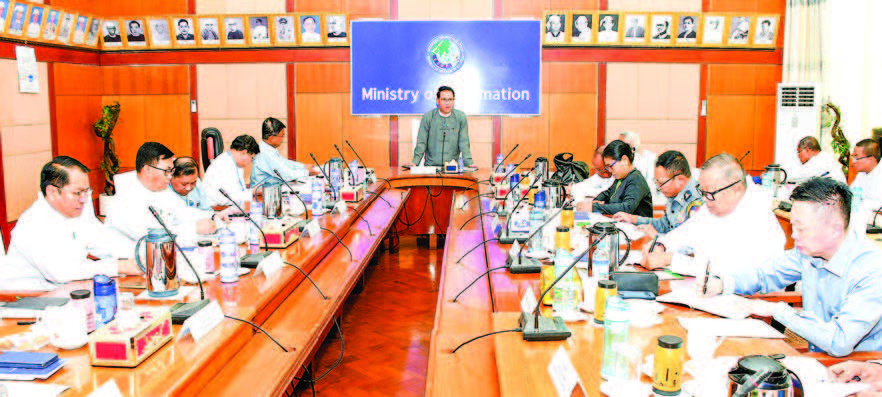A coordination meeting on broadcasting movies via telecommunication networks was held yesterday morning at the meeting hall of the Ministry of Information in Nay Pyi Taw.
The meeting was attended by Union Minister for Information U Maung Maung Ohn, Deputy Minister U Ye Tint, the permanent secretary, departmental heads, representatives from the Ministry of Home Affairs and the Ministry of Legal Affairs, the chairpersons of the Myanmar Motion Pictures Organization (MMPO) and the Myanmar Music Association (Central), along with their secretaries and members, as well as guests.
During the meeting, Union Minister U Maung Maung Ohn highlighted the growing trend of movie distribution via online platforms such as social media, apps, Facebook, YouTube, Viber, and Telegram. He expressed concerns that many online films evade censorship and contain content that undermines the state’s policies, religion, racial harmony, national unity, and cultural values. Additionally, he noted that some films promote illicit activities such as gambling and sexual services.
U Maung Maung Ohn stressed that such content could negatively influence young people, leading to misunderstandings and inappropriate behaviour. Furthermore, the state loses revenue due to the lack of regulation and licensing for online movies.
In response to these challenges, efforts are underway to draft a new Myanmar Movie Law suitable for the digital era. Meanwhile, the ministry aims to regulate the production and distribution of movies using digital technology to safeguard traditional values and promote national unity.
To enforce these measures, the Ministry of Information issued three orders on 13 March: Order No 31/2024 designates broadcasting movies via telecommunications networks as an essential service, Order No 32/2024 permits businesses to broadcast movies via telecommunications networks, and Order No 33/2024 grants authority to the Information and Public Relations Department (IPRD).
These orders will come into effect one month after 13 March, with penalties under Section 5 of the Special Commodities and Services Law for non-compliance.
The orders classify businesses into three categories: establishing cinemas using telecommunication networks, launching movie apps, and broadcasting movies via telecommunication networks.
The Union minister emphasized that laws and directives are issued for necessity rather than control. The ministry’s objective is to ensure businesses operate systematically within the law and promote Myanmar’s cultural values through scrutinized movie broadcasts using advanced technologies.
Deputy Minister U Ye Tint discussed the transition of illegal businesses to lawful ones and safeguarding citizens’ well-being and interests. Daw Aye Aye Win, Deputy Director-General of the Ministry of Legal Affairs, addressed legal considerations.
Representatives from MMPO, MMA, Myanmar Police Force, and other stakeholders discussed legal measures to combat movies and films that undermine Myanmar’s culture, traditions, and customs. — MNA/ TMT



